Digital Presentation: Case Conference
Group Participation Declaration Form
In a group assessment, it is common for individuals to invest varying amounts of time, effort, and value into collaborative tasks. Disparities in contributions can sometimes lead to perceived imbalances among group members, fostering feelings of inequality and exclusion. Typically, a natural leader emerges to identify and leverage each member's strengths. Unfortunately, your learning facilitator cannot directly address these issues and rely on your maturity as adults to ensure equitable participation was made to complete this assessment.
At times, there may be instances where a member contributes minimally or not at all. While valid reasons like illness may explain such situations, it is crucial to acknowledge that awarding the same grade to an inactive participant as to those significantly contributing is unfair. This document serves to provide each group with a mechanism to acknowledge, reward, or address individual contributions. All group members are expected to discuss, complete, sign, and submit this form with your assessment output (video and action plan) via the Assessment 1 Box on the given due date.
Choose one of the options below:
- Option 1: We agree that all group members made a valuable contribution and, therefore, believe it is fair that each member receive the same grade for the oral presentation.
- Option 2. We disagree that all group members made a valuable contribution. Please adjust our grades based on the following percentage of contribution.

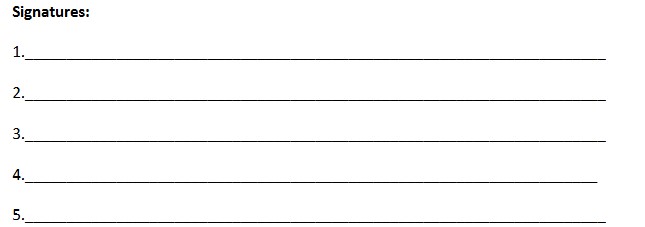
In case you cannot reach a consensus, your Learning Facilitator/Subject Coordinator will meet with all members of a group at one time. I hope that we will not have to do this because I am not privy to the group's contributions and would prefer you come to a consensus by yourselves.
This form is adapted from https://www.umsl.edu/~rottmanj/5800/groupform.html
MHC303 Assessment 1: Digital Presentation - Group Participation Declaration Form Torrens University Australia 2023
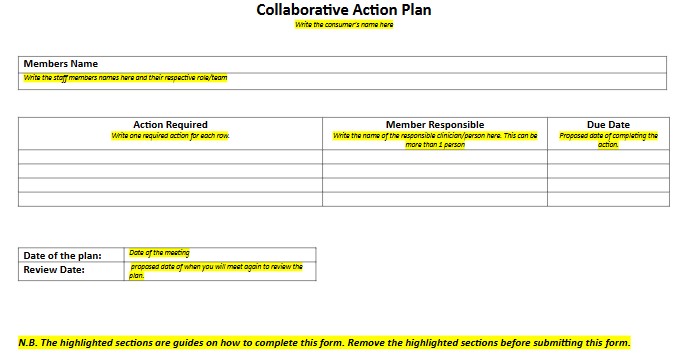
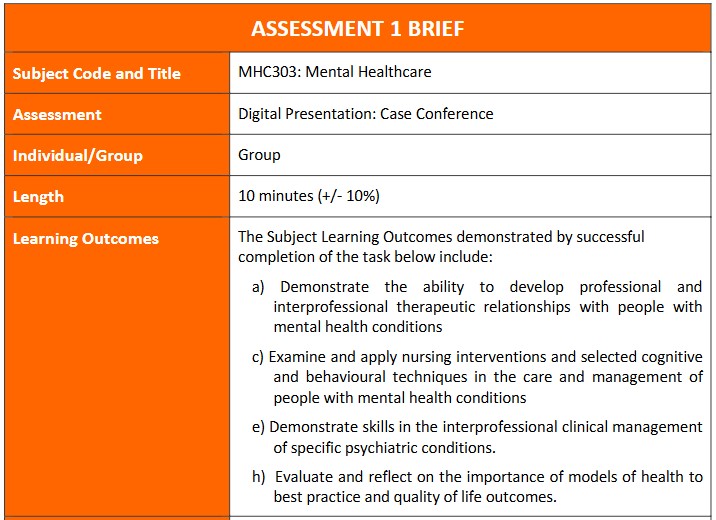

Assessment Task
In this assessment, your group is tasked with engaging in a 10-minute web conference discussion to address the transfer of care and care planning for a mental health consumer based on the provided case study. Each group member represents a Registered Nurse from a different mental health team. The discussion aims to justify the most appropriate team to assume the consumer's care. By the end of the meeting, your group should have agreed upon a comprehensive plan for the consumer.
Context
A Registered Nurse purposefully engages in effective professional relationships, including participating in and/or leading collaborative practice and engaging with professionals and others to share knowledge and practice that supports person-centred care.
Through engaging in group activities, students will enhance their verbal communication abilities, gain insights into managing complex consumers, and acquire the skills needed to collaborate effectively within a team setting. This collaborative approach aims to optimise outcomes for an individual with complex mental health conditions.
Instructions
1. On Week 2, students will be assigned to a group of four (4) members. Once the group has been allocated, you are responsible for reaching out to your members to plan your
discussion.
2. Read the case study in Assessment Folder 1.
3. Based on the case study, your group is expected to prepare an agenda and script for your team meeting by researching and understanding the situation of the specific consumer in
question. You can use different literature, local/national policies and reports to support your discussions. Each team member must thoroughly comprehend their respective Mental
Health teams role and responsibilities within mental health nursing.
4. Your group needs to record the teams discussion on the consumers care requirements. You can use any web conferencing platform (e.g., Collaborate Ultra, Microsoft Teams, Skype,
Zoom) to conduct your meeting. Each team member needs to present in a maximum of 2.5 minutes (this can be split throughout the conference). You are encouraged to make a script
to help you ensure the flow of the discussion.
5. The presentation should be formatted in a formal meeting, with one member chairing it. You are expected to have your camera on throughout the meeting and demonstrate
professionalism, including wearing your Torrens University Nursing Uniform.
6. During the web conference, your group must address the following points:
a. Analysis of the Case Study and Reason for Transfer of Care
i. Analyse the provided case study, identifying the key factors necessitating the transfer of care.
ii. Justify the need for transfer based on the consumer's mental health condition and individual circumstances.
b. Evaluation of Different Mental Health Models of Care:
i. Evaluate three (3) mental health models of care (e.g., Assertive Mental Health, Early Psychosis, Case Management, Crisis Intervention, etc).
ii. Considering the case study details, justify the selection of the most suitable model to meet the consumers specific needs.
c. Identification and Rationalisation of Other Services:
i. Identify additional services beyond nursing care that the consumer will require (e.g., social work, occupational therapy, family support).
ii. Provide a rationale for each identified service, explaining how it contributes to the consumers holistic care.
d. Collaborate Action Plan:
i. Develop a clear and detailed action plan for the consumer's care, integrating all discussed aspects.
ii. Ensure unanimous agreement within the group on the finalised plan.
iii. Complete an action plan from the meeting using the template provided.
7. Complete the Group Participation Declaration Form to indicate each members participation in the work. The form is available in the Assessment 1 folder.
Submission Instructions
Submit this task via the assessment link on your group page in the LMS portal. Nominate a member of your team to upload the following in the assessment box:
- Video recording via Kaltura
- Group Participation Declaration Form
- Collaborative Action Plan
You do not need to upload your script. However, this must be available upon request of your marker.
Academic Integrity
All students are responsible for ensuring that all work submitted is their own and is appropriately referenced and academically written according to the Academic Writing Guide. Students also need to have read and be aware of Torrens University Australia Academic Integrity Policy and Procedure and subsequent penalties for academic misconduct. These are viewable online.
Students also must keep a copy of all submitted material and any assessment drafts.
Special Consideration
To apply for special consideration for a modification to an assessment or exam due to unexpected or extenuating circumstances, please consult the Assessment Policy for Higher Education Coursework and ELICOSand, if applicable to your circumstance, submit a completed Application for Assessment Special Consideration Formto your Learning Facilitator.
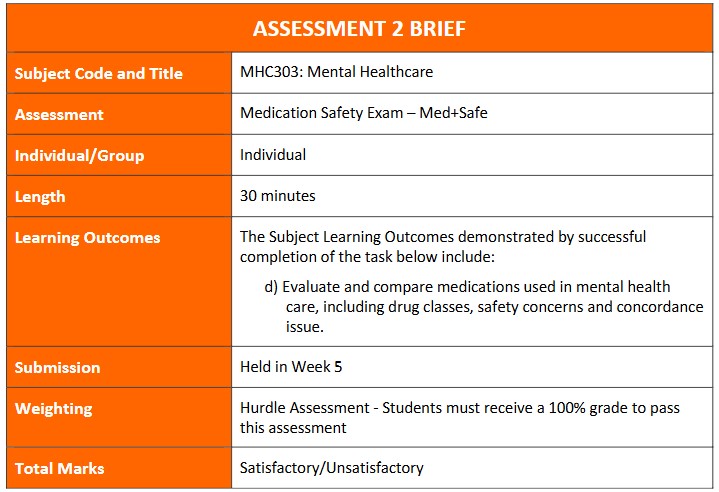
Assessment Task
You will have 30 minutes to complete a medication safety exam encompassing your medication calculation formulas in the Bachelor of Nursing degree. This is an on-campus examination.
Context
Competency in clinical skills is an essential component of professional nursing practice and the Registered Nurse Standards of Practice. One such clinical skill is that of the safe administration of medications.
To successfully administer medication, Registered Nurses must calculate the correct dose to administer. Patient safety depends on this correct calculation; therefore, you will be assessed on your ability to calculate correct doses in a variety of situations.
This assessment will examine your critical thinking related to medication safety. This will occur via a 30-minute medication safety exam. This is a satisfactory/unsatisfactory assessment; you must achieve 100% to pass it.
Instructions
This is an on-campus examination that will be held on Week 5. A class announcement will provide the exact time, date and room allocation for this medication safety exam.
This medication safety exam will be conducted under exam conditions via the Med+Safe Intellilearn portal.
The length is 30 minutes.
It is a closed-book exam. You are not allowed to have smartphones or take any notes in the exam.
You are required to have a pen and a laptop or tablet (please bring your charger). A calculator will be provided to you.
Further information will be provided throughout the trimester.
Referencing
No referencing is required for this assessment.
Submission Instructions
Submit your scorecard in the Assessment link in the main navigation menu in MHC303: Mental Healthcare. The Learning Facilitator will not release your mark until a scorecard is uploaded and verified by your Learning Facilitator.
Special Consideration
To apply for special consideration for a modification to an assessment or exam due to unexpected or extenuating circumstances, please consult the Assessment Policy for Higher Education Coursework and ELICOSand, if applicable to your circumstance, submit a completed Application for Assessment Special Consideration Formto your Learning Facilitator.
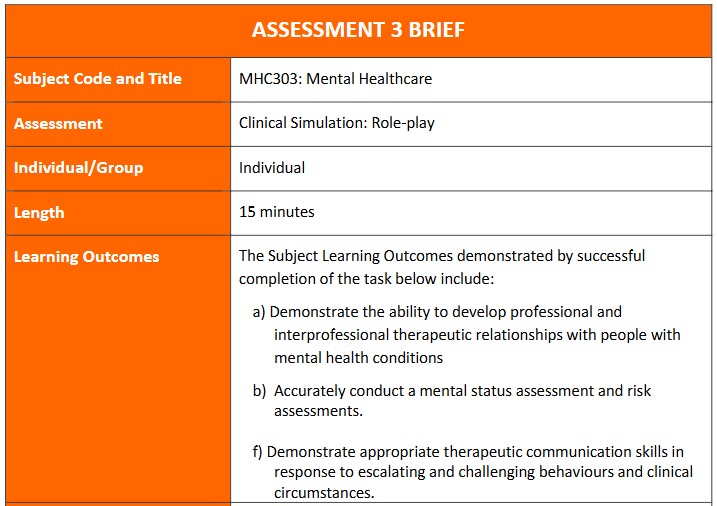

Assessment Task
In 15 minutes, you will participate in a simulated scenario where you will interview an individual experiencing a mental health crisis/disturbance. During the interview, you must employ effective and therapeutic communication to elicit information whilst assessing the individuals mental state.
Context
A Registered Nurse (RN) uses a range of assessment techniques to systematically collect relevant and accurate information whilst purposefully engaging in effective therapeutic relationships. This assessment will evaluate students skills and capabilities in assessing an individual with mental health issue/s. It is designed to prepare them for real-life clinical circumstances RNs face in any clinical area, but more so in the mental health arena.
Instructions
1. Read the case study available in Assessment Folder 3. The case study will be made available the week before the assessment.
2. On the day of the assessment, you will be given a pre-brief to orient you on the set-up of the environment. No other information will be given to you at this stage.
3. You are expected to come prepared. Your assessor will indicate when your time starts and finishes.
4. You will be interviewing your assessor/actor portraying a person experiencing a mental health issue. Please note that you will be playing the role of an RN and not a student nurse.
5. You must present professionally throughout the assessment, i.e., abiding by the NMBA Standards of Practice for Registered Nurses, including wearing your TUA nursing uniform and
ID.
6. During the role-play, you are expected to:
a. Demonstrate effective and therapeutic communication skills and rapport building.
i. Proper introduction, asking for consent, and conclusion
ii. Appropriate use of recovery-oriented language
iii. Effective verbal and non-verbal communication
iv. Cultural safety
b. Collection of appropriate assessment data relevant to Mental State Examination (MSE) and Risk Assessment (RA).
i. Ask relevant questions relating to:
Mood
Thought form/content.
Perception
Cognition
Insight and judgment
ii. Ask relevant questions relating to risks (static and dynamic)
c. Demonstrate appropriate nursing intervention/skills in response to escalating and challenging behaviours and clinical circumstances. (e.g., use of verbal de-escalation, psychoeducation, etc.)
7. You can take notes during the interview.
8. After the simulation, complete the MSE and RA forms and upload them in Assessment Folder 2 within 24 hours.
9. At the end of the simulation, you will debrief with your assessor, but they will not give your mark.
Important information:
This is an on-campus assessment that will take place on Week 7. The exact date and room allocation will be posted via announcement. Your assessor will allocate your assessment time.
Arrive at least 10 minutes before your allocated time to prevent any delays, and you are settled before your assessment.
o If you arrive late, you can only complete the assessment on the remainder of your time allocation. Your facilitator will not give you extra time.
o If you arrive 10 minutes (or more) late, your assessor will automatically mark you as zero (0)/non-attempt without approved special consideration.
This assessment will be held in a simulated learning environment with a facilitator on campus.
You are expected to bring printed copies of the forms available in the Assessment 3 folder. You can complete these forms after the role-play. Your assessor can ask for a copy of these
completed forms on the day of the assessment.
The facilitator/actor will neither prompt you nor offer any information that is not requested.
Submission Instructions
Submit scanned copies of relevant forms completed after the role-play into the Assessment 3 folder link in the assessment section found in the main navigation menu of the subject Blackboard site. A rubric will be attached to the assessment. The Assessor will provide feedback via the Grade Centre in the LMS portal. Feedback can be viewed in My Grades.
Academic Integrity
All students are responsible for ensuring that all work submitted is their own and is appropriately referenced and academically written according to the Academic Writing Guide. Students also need to have read and be aware of Torrens University Australia Academic Integrity Policy and Procedure and subsequent penalties for academic misconduct. These are viewable online.
Students also must keep a copy of all submitted material and any assessment drafts.
Special Consideration
To apply for special consideration for a modification to an assessment or exam due to unexpected or extenuating circumstances, please consult the Assessment Policy for Higher Education Coursework and ELICOSand, if applicable to your circumstance, submit a completed Application for Assessment Special Consideration Formto your Learning Facilitator.
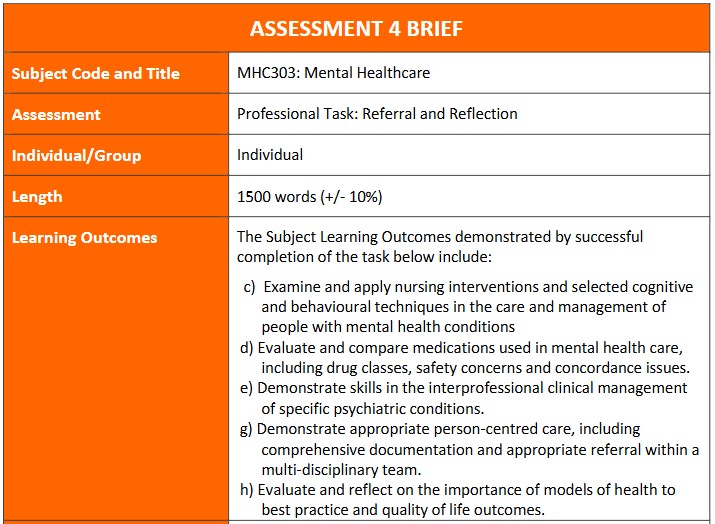

Assessment Task
In this assessment, students will demonstrate their ability to communicate and document consumer information effectively by writing a referral letter to an appropriate team or service. The referral letter should be based on the information gathered during a simulated interview (in Assessment 3). Additionally, students will use the Gibbs Cycle to reflect on their experience, providing a critical analysis of their role play (caring for an individual with mental illness).
Please refer to the Instructions for details on how to complete this task.
Context
A Registered Nurse (RN) uses assessment data and the best available evidence to develop a plan that is documented and communicated. Critical analysis of the information gathered is essential in formulating a collaborative recovery plan for an individual experiencing mental illness.
Furthermore, an RN develops practice through reflection on experiences, knowledge, actions, feelings, and beliefs to identify how these shape practice. Reflection on practice is essential to clinicalreasoning, providing insights for continuous practice improvement and ongoing professional development. This is a reflective piece about your thinking and viewpoint regarding forming your professional identity and how professional regulations will underpin your nursing practice.
Instructions:
Task 1: Referral letter (500 words)
1. You must write a comprehensive referral letter to an appropriate team or service, drawing upon information obtained during the simulated role-play/interview (Assessment 3).
2. The letter must include the following:
a. Purpose of the letter.
b. Brief (relevant) history of the consumer
c. The current presentation of the consumer
d. Expected outcome/s from the referral and/or reasons for referral.
3. You are expected to write in a professional manner and use appropriate medical terminologies.
4. There are no references required for this part of the assessment.
Task 2: Reflection using the Gibbs Cycle (1000 words)
1. Utilise the Gibbs Reflective Cycle to critically reflect on your experience during the role-play (Assessment 3). Consider the following questions for each stage of the cycle when writing your reflection:
a. Description: What happened? What specific details stood out during the consumer interview?
b. Feelings: What emotions/feelings did you experience during the simulation? What personal, cultural, and ideological beliefs- inform the feelings you have noted? Were there any known or perceived difficulties with the activity?
c. Evaluation: What is good and bad about the experience? What could have been better? How might the facts and feelings have affected your actions/behaviour?
d. Analysis: What ethical, legal, and professional considerations influenced your decisions? What sense can you make of the experience? What is the main area of concern or focus on the future? What (personal and acquired) knowledge helped you understand the experience?
e. Conclusion: What did you learn from the role-play and in writing this reflective piece? What else could have been done? What are the implications of this reflection on your future practice and decision-making?
f. Action Plan: What will you do differently if you get involved in the same situation? How will you develop the required skills needed? How can you ensure the planned strategies are embedded in your interaction in similar situations in the future or in your future practice as an RN?
N.B.: You do not need to answer all the questions in each of the stages. The questions are recommendations only to help you write this assessment.
2. Research for academic references to support your arguments. There are references available in Blackboard that we recommend that you use for this assignment. Use peer-reviewed
literature to support your arguments. Do not refer to consumer information websites or blogs to keep your discussions (e.g., Mayo Clinic, Better Health Channel, WebMD).
3. Use first-person pronouns for your reflection.
Formatting
A cover page must be included, which includes the subject name and code, assessment number, student name, student number and word count.
Present your assessment in 12-point font, Arial or Times New Roman, 1.5 line spaced and a 2.5 cm margin on each side.
Page numbers should be included in the footer, along with the student ID number.
The paper is to conform to the convention of academic writing, with a logical flow of ideas. You must write your thoughts in complete sentences and paragraphs with accurate spelling, grammar, and punctuation. Dot points are not allowed.
There must be clear identification and evidence of understanding of significant issues, with proof of critical examination of issues, including sound arguments and positions adequately
supported by scholarly peer-reviewed literature.
Ensure you comply with the word limit. Use your computer to total the number of terms used in your submission. In-text references will be included in the word count. However,
your reference list at the end of your assignment is excluded from the word count.
You can use headings for both assessment tasks to guide your reader.
Referencing
This assessment requires more than five (5) references. Use recent, relevant, and reliable resources to complete this task. These should be peer-reviewed literature related to the subject matter, no older than seven (7) years.
It is essential that you use appropriate APA style for citing and referencing research. Please see more information on referencing in the Academic Skills webpage.
Submission Instructions
Please upload your paper for marking purposes via the Assessment 4 link in the main navigation menu. The Learning Facilitator will provide feedback via the Grade Centre in the LMS portal. Feedback can be viewed in My Grades.
Academic Integrity
All students are responsible for ensuring that all work submitted is their own and is appropriately referenced and academically written according to the Academic Writing Guide. Students also need to have read and be aware of Torrens University Australia Academic Integrity Policy and Procedure and subsequent penalties for academic misconduct. These are viewable online.
Students also must keep a copy of all submitted material and any assessment drafts.
Special Consideration
To apply for special consideration for a modification to an assessment or exam due to unexpected or extenuating circumstances, please consult the Assessment Policy for Higher Education Coursework and ELICOSand, if applicable to your circumstance, submit a completed Application for Assessment Special Consideration Formto your Learning Facilitator.
Are you struggling to keep up with the demands of your academic journey? Don't worry, we've got your back!
Exam Question Bank is your trusted partner in achieving academic excellence for all kind of technical and non-technical subjects. Our comprehensive range of academic services is designed to cater to students at every level. Whether you're a high school student, a college undergraduate, or pursuing advanced studies, we have the expertise and resources to support you.
To connect with expert and ask your query click here Exam Question Bank

